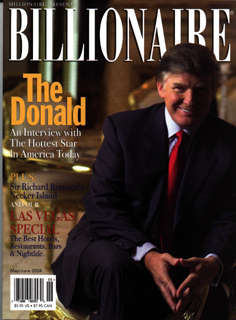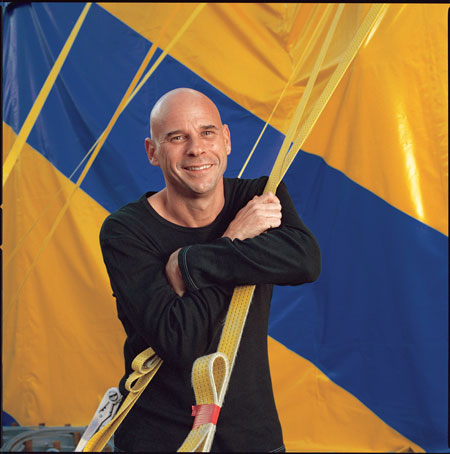

 |
 |
GUY LALIBERTE — Billionaire Head of the World's Fastest Growing Circus by Kaya Morgan

Magical, joyous and overwhelmingly beautiful, more than 7 million people paid $650 million to see a selection of Cirque du Soleil's breathtaking performances last year. With television licenses and corporate sponsorships in the millions, very little debt, and a pretax margin of around 25%, Cirque productions have successfully fused music, dance, theatre, and gee-whiz acrobatics into an enormous spectacle of highly-emotional whimsy.
The story of Cirque du Soleil is a triumphant one. Born to a large middle-class family in Quebec City, Canada, and raised in the small town of St-Bruno, Guy Laliberté left home at age 18 to hitchhike across Europe working as a street performer. Certainly, he will never forget spending his first night in London on a public bench at the corner of Hyde Park with his backpack, two accordions, a mouth organ, spoons, a jew's harp and less than $1,000 in his pocket.
 During the course of his travels, although lean of cash, Laliberté became rich in experience. He met many other sidewalk showmen along the cobble-stoned alleyways around the major tourist attractions. He lived hand-to-mouth, and learned the art of fire-breathing and stilt-walking, working for small change to pay for the basics. But how Cirque du Soleil evolved from a bunch of unemployed kids trying to turn a buck on street corners into Quebec's second largest cultural export (after Celine Dion) is the stuff of provincial legend.
During the course of his travels, although lean of cash, Laliberté became rich in experience. He met many other sidewalk showmen along the cobble-stoned alleyways around the major tourist attractions. He lived hand-to-mouth, and learned the art of fire-breathing and stilt-walking, working for small change to pay for the basics. But how Cirque du Soleil evolved from a bunch of unemployed kids trying to turn a buck on street corners into Quebec's second largest cultural export (after Celine Dion) is the stuff of provincial legend.
Initially, “It was just an adventure, and I was planning to go back to school and have a regular life,” Laliberté recalled in a recent interview. But, he became so enthralled with the lifestyle that he perceived it as a perfect art form. Upon his return to Montreal, he began organizing parties and street festivals out of a youth hostel. Then in 1984, at age 24, and with hair down to his waist, he landed a contract from the Quebec government to stage a street show for Quebec's 450th anniversary celebration.
 It was only a one-shot deal, and they were already off to a rough start, as Laliberté has said, “We had every problem starting a big top could have. The tent fell down on the first day. We had problems getting people into the shows. It was only with the courage and arrogance of youth that we survived.” But it was more than that. Although the event only returned a modest $40,000 in profit, Laliberté was already planning the next event. Even without adequate funds, his unfailing drive to succeed prompted him to sign almost $1.5 million in contracts prior to the commercial lenders giving their O.K.
It was only a one-shot deal, and they were already off to a rough start, as Laliberté has said, “We had every problem starting a big top could have. The tent fell down on the first day. We had problems getting people into the shows. It was only with the courage and arrogance of youth that we survived.” But it was more than that. Although the event only returned a modest $40,000 in profit, Laliberté was already planning the next event. Even without adequate funds, his unfailing drive to succeed prompted him to sign almost $1.5 million in contracts prior to the commercial lenders giving their O.K.
Now Laliberté had the taste of the circus in his blood, and the creative juices began to flow freely. Although the second season ended with the tour a half million dollars in the red, it was so well received as to be judged a national treasure. Not satisfied to sit on the sidelines, he went for broke and took a huge gamble by booking an act for the opening of a Los Angeles art festival. “I bet everything on that one night,” he recalled. If we failed, there was no cash for gas to come home.”
Success hit like a thunderbolt, and it has not stopped yet. Nearly 20 years in the making, Laliberté is one of the biggest entertainment impresarios in the world as sole proprietor of Cirque du Soleil. Over 30 million people worldwide have seen its shows. Without question, Laliberté has single-handedly revitalized the circus in North America, and created a revolution in the entertainment industry. Three of the company's eight productions appearing on three continents are permanent installations. In Las Vegas, the three shows – Mystère, O and Zumanity – play to 9,000 people per night, or 5% of the city's total visitors. The shows' success has received a high degree of recognition in the entertainment industry.
Being able to tap into those long-forgotten childhood memories of his audience, Laliberté is firm in his belief that, “Inside every adult there's still a child that lingers. I think we tend to forget we were children before. We're happiness merchants – giving people the opportunity to dream like children.”
Artistic imperatives continue to underlie Cirque's corporate decisions. And with development of the art form, comes development in other areas. At Cirque's headquarters in Montreal, they now have state-of-the-art training facilities and creative studios. Unlike most circus acts which are a collection of unrelated variety acts, Cirque's shows have a narrative and plot set to rock or world music with the emphasis on athletic and acrobatic skills under the artistic direction of people whose background is in the theatre.
Beyond that, Laliberté has strong personal convictions. “We are in a position of financial and social power, and we could be agents of change in our society. Without pretension, I believe we could be a nice little gardener who takes care of the garden, and hopefully our neighbor will do the same. Fortunately, for Laliberte, he has turned his passion into a $1.5 billion dollar payday with TPG Capital of Caesar's Entertainment including a top private investment group in China. Guy remains a 10% shareholder, and creative contributor to the company.
To find more about Guy Laliberté, go to www.cirquedusoleil.com
More stories by journalist, Kaya Morgan, can be found by clicking the link. Contact us for reprint rights as most articles are available.

All rights reserved ©
Press Coverage | VentureCapital | Business Development | Venture Opportunities | Resources | Contact Us | Investor Extras | Home